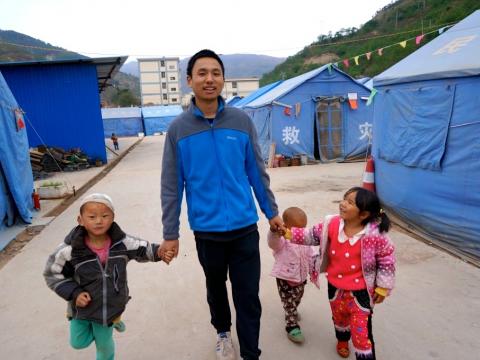Disaster Risk Reduction - Science over tradition in earthquake aftermath

By Echo Chow
Children, including four-year-old Xiaoxiao, play joyfully in the tented resettlement area in Huijiezi Township, Ludian county of Yunnan province, China.
Not long ago, Xiaoxiao liked to help her parents work in the fields, along with her eight-year-old brother. They lead a peaceful life until a strong earthquake struck last year.
On 3 August 2014, a 6.5 magnitude earthquake struck Ludian County, Yunnan province, killing 620 people and injuring more than 3,000.
Xiaoxiao remembers that day vividly.
She was helping her father, Changlong, in the field when she suddenly felt the ground shaking violently. She didn’t know what an earthquake was, and desperately clung to her father in fear. When it stopped, they immediately ran home, only to find their house destroyed. Her mother, Xingzhi, had head injuries, and her brother was crushed by the debris, dead.
With no place to live, Xiaoxiao and her parents were relocated to a resettlement area. The once happy Xiaoxiao no longer had a smile on her face.
World Vision established a Child Friendly Space (CFS) inside the resettlement area. Each day Changlong takes Xiaoxiao to the CFS, a place where she can play with other children and the staff. Sometimes her mother also joins in the activities.
A CFS supportsand protects children in emergencies. Children are the most vulnerable during disasters, both emotionally and physically. CFS provide young people with a safe place to play, participate in activities, learn about their rights to health and protection, and experience healing from distress they’ve experienced. They promote children returning to healthy routines and experiencing a sense of normalcy again.
“I like the games they play here. I especially like the one where we pretend that the ground is shaking and we have to run and hide under a table with our hands on our heads. We then have to quickly run out when the ground no longer shakes,” Xiaoxiao demonstrated with actions as she spoke.
World Vision, together with cooperating partners, jointly organised various DRR activities and drills.
Xingzhi said, “I am illiterate and have never heard of disaster risk reduction (DRR). Since participating with Xiaoxiao during these parent-child activities organised by World Vision, I have learnt a lot about self-protection measures. Had we had some basic knowledge in self-protection, my head wouldn’t have been injured and maybe, my son wouldn’t have lost his life.”
Changlong said that he had never experienced such a strong earthquake, but growing up, was told of some of nature’s early warning signs when an earthquake was on the way. He was told to watch out when dogs and chickens wouldn’t eat, when water appeared murky or would be bubbling in wells, and times where cattle were behaving strangely. However, he did not see such abnormal phenomena before last year’s earthquake.
Villagers are working to increase their knowledge in DRR, strengthen their awareness, and enhance their early warning systems so that they can better deal with a natural disasters as they occur.